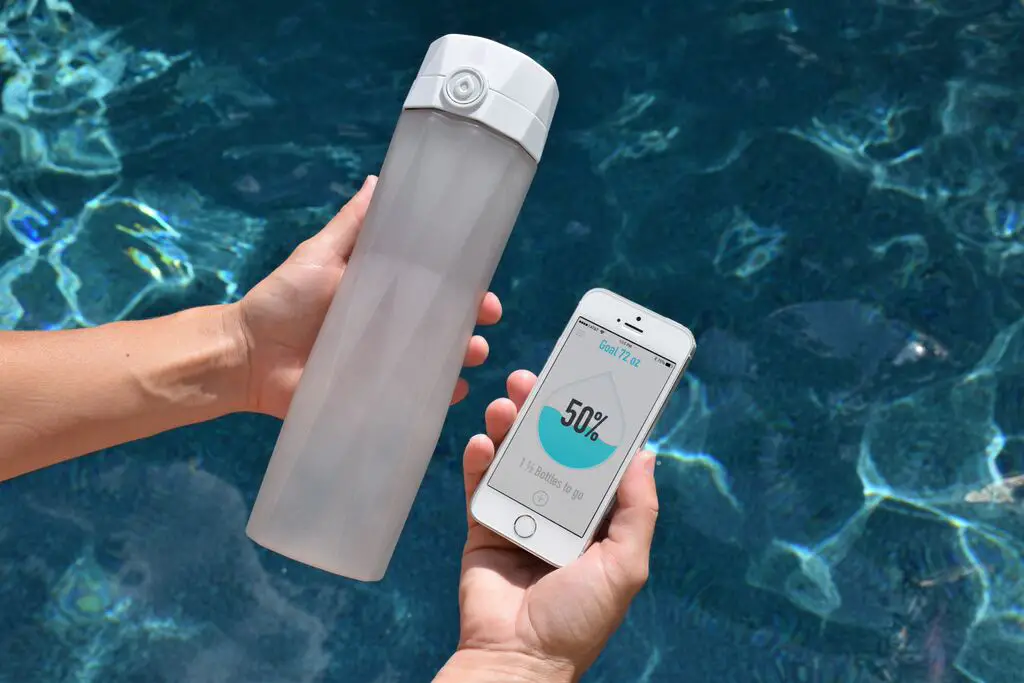Around 2015, the first smart water bottles started appearing on the market, and suddenly it seemed that anybody who could afford one was jumping at the chance to own a water bottle that monitored your water-drinking habits. Smart water bottles have become a bit of a health craze, appealing to people who feel they don’t drink enough water and want some help with becoming healthier.
For the athlete or the busy person who often forgets to drink enough water because hydration slips their mind on a typically chaotic day, a smart water bottle might be a good choice. But for everyone else, is this new trend worth the hype? There are several pros and cons of smart water bottles to take into account before you buy one.
First of all, how do they work? By calculating your personal needs based on height, weight and sex, smart water bottles track your water intake throughout the day and tell you when you need to drink more. Some connect to Fitbit, others are compatible with Apple Health and one doesn’t connect to any outside service at all, but helpfully lights up when you can’t find it or when you haven’t had enough to drink. Each has a sensor that calculates when you need to drink, so no matter what extra gadgets different brands or models might have, they all complete the same basic function.
Hidrate Spark is one particular startup that has been rising to the top of the market recently; they advertise their bottles’ compatibility with both Android and iOS, as well as the light built into the bottle that flashes “to remind you to drink more water and to celebrate when you’ve met your daily goal.” Marketed mostly toward athletes, Hidrate Spark and other smart water bottles seem on the surface to be a great way to stay hydrated and work toward a healthier lifestyle.
[su_youtube url=”https://www.youtube.com/watch?v=2QuXUzwma2k”]
But this type of water bottle introduces a kind of competition and unreachable standard into a basic human function — drinking when you’re thirsty is a simple evolutionary tactic, and the idea that we need to drink a certain amount of water at certain times in order to stay healthy is relatively new. Smart water bottles end up introducing an unnecessary element of obsessive competitiveness into people’s lives, arguably an unhealthier consequence than not drinking enough water in the first place.
However, with the popularity of sugary drinks in our culture, smart water bottles may promote weight loss by encouraging people to drink water rather than pop or juice, since drinking a lot of water is proven to help with weight loss. Many smart water bottles explicitly tell buyers on their websites to use their bottles only for water, not for sugary or concentrated drinks. Since they are meant to encourage people to drink more water, owning one could genuinely make it easier to kick a sugary-drink addiction or follow through on a New Year’s resolution and lose some weight.
Financially, however, this smart water bottle and others like it may not be worth all their helpful features. For example, a standard plastic or glass water bottle costs around $10–30, whereas a smart bottle can cost anywhere from $20–100, depending on how many bells and whistles are included.
The level of customization these high-tech drinking devices can include borders on the insane, ranging in practicality from glowing lights to Android compatibility and built-in sensors. And no matter how smart it may be, a $100 water bottle hardly seems worth the price.
Even from a practical standpoint, smart water bottles are not ideal. One bottle’s Amazon page warns that it doesn’t fit in car cupholders; others glow periodically to alert you to drink more, which could be inconvenient or distracting in some settings, such as during an exam or while driving. A smart water bottle also seems like the sort of thing that would quickly lose its novelty as your motivation to use it decreases, and spending a significant amount of money on something that you rarely use doesn’t seem particularly practical.
All that being said, many of the perks of smart water bottles might be worth the money if you work out a lot or simply want some help in making sure you’re living as healthily as possible, no matter your workout habits. But if you don’t want to spend that much money on a smart water bottle, however, you can digitally track your hydration in other ways.
Free apps such as My Water (iPhone), Daily Water (iPhone and Android), Hydro Coach and Gulp (both Android only) help you track how much water you are drinking versus how much you need to drink. If you, like many college students, are already dependent on apps to remind you when you have to go to class and work, how many steps you take each day, when your homework deadlines are or when your next period will be, downloading a hydration-tracking app might be more efficient than buying an expensive water bottle.
All in all, it seems that while a smart water bottle is a good option for those who care enough about hydration and have enough money to buy one, but otherwise, why spend your money on another gadget when an app on your phone can complete the same function for free? And why buy a glowing water bottle when you can receive a notification on your phone telling you the same thing in a less obnoxious way?
Before you go to buy a smart water bottle, take all of this into consideration — but if you do end up getting one, have fun with it. It’s a useful tool to help you stay healthy, and its features make staying hydrated a fun and manageable daily goal. If you have the motivation to keep using your bottle consistently, you can take charge of your health, lose weight and start working toward all your health-related goals.

















